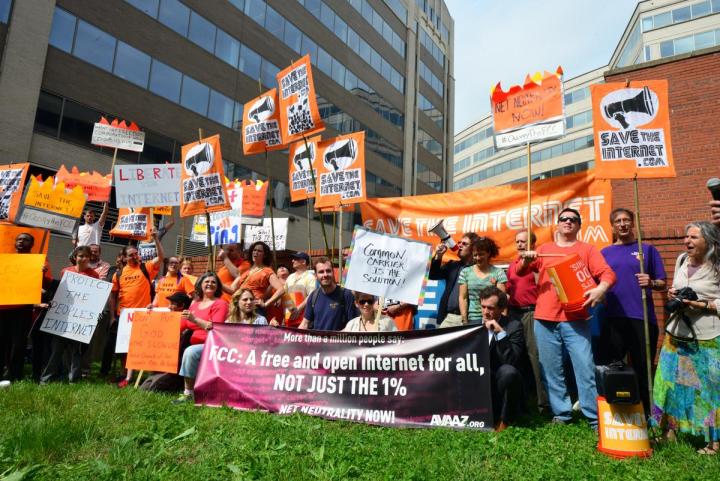
Back in June, a Net neutrality rant from comedian John Oliver inspired Internet commenters to do what they do best: criticize, attack, and call people names, but this time, he asked them to do it in defense of a free Internet. Commenters gleefully complied with Oliver’s request and crashed the FCC’s comments page with expletives, bad names, and rude commentary.
This outpouring of public outrage and anger of the FCC’s proposal to create Internet fast lanes and effectively kill the spirit of democracy and innovation that characterizes the Web, prompted the FCC to reconsider — for a time. Then, it decided to proceed with its original idea and the Internet went nuts. Hence the extended window for comments, which has been extended yet again. As of Thursday afternoon, the FCC said it had received more than 1 million comments on the issue.
This time around, many of the comments have been more serious and thoughtful. Big tech companies and ordinary people wrote in support of the open Internet. In their comments, many young Americans ask the FCC to preserve Net neutrality so that they can better compete in the work force and have equal access to all information from the Web, regardless of which website it’s from. Others reference America’s commitment to a free market economy and the basic structure of capitalism, which demands that all ventures have equal opportunity to compete, so that the best service is made available.
Internet service providers are corrupt
Commenter Eric Madigan argued that the limited number of Internet Service Providers (ISP) available to customers in the United States is deplorable and anti-American. “Most Americans have only one choice for truly high speed Internet: their local cable company,” he wrote. “This is a political failure, and it is an embarrassment. America deserves competition and choice.”
Commenters went directly after the FCC, saying it and the U.S. government doesn’t really care what the people think.
“It is already apparent that the end goal by ISPs is to make more and more and more money,” he wrote. “In reality who ends up paying more? The U.S. Internet consumer, that’s who.”
John Santo agreed, saying that “a pay-to-play Internet worries me because network bandwidth is extremely cheap, and the profits made by ISPs are already large. ISPs are trying to double dip their profit by charging both the content providers and consumers based on content and bandwidth, without using the money they currently possess to improve their infrastructure and improve performance on their already highly saturated networks.”
One commenter named Cathy Poff seconded his opinion, arguing that ” if companies that provide Internet access are able to prioritize which websites and content are provided at fast and slow speeds, they will be able to infringe upon the spirit of capitalism, and possibly even the freedom of speech.”
Internet fast lanes will stifle innovation
One of the more common themes in the comments centered around the important role that the open Internet plays in sparking innovation.
Commenter Adrian Toribio stated that “a pay-to-play Internet worries me because any person or company with enough sums of cash could easily buy and shut down the voices of anyone that opposes them.”
“Set aside the economic repercussions,” he added. “The destruction of any and all small online businesses that are trying to compete in this monopolized world, the very freedoms of the people are being taken … This country and the world is slowly turning to the rich to make all its decisions, not the majority. Allowing money to dictate the use and speed of the internet is the literal murder of democracy, and the last true bastion of public forum we have as a nation and as a world.”

Monica Banasiuk shared Toribio’s view. “This is horrendous and will be the death of anyone with a bright idea but no money,” she wrote. “The internet is intended to be equal opportunity, a level playing field. Do not make it easier for monopolies to stay monopolies.”
Commenter John Basler, added that “allowing a non-neutral Internet would allow de-facto monopolies to arise, and stifle growing e-business.”
The government doesn’t care
Meanwhile, other commenters went directly after the FCC, saying that the organization and the U.S. government as a whole doesn’t really care what the people think.
One such comment from Will Kommor began in a sarcastic vein, promising not to use flowery language or overstate the importance of Net neutrality, but ended with a truly heartfelt sentiment, with which many other commenters agreed.
“Revolution will be closer than you expect. And the people who sold out, will be left out.”
“But like I said, nothing flowery. So what else can I say? I’m filling out a form,” he concluded. “Please don’t let our leaders choke the Internet. Plain and simple English. Because without the Internet, language is all I have.”
Commenter Alan Mayo wrote the FCC to say that if the government continues to stifle free speech, “revolution will be closer than you expect. And the people who sold out, will be left out.”
The FCC should protect the Internet’s future
Most commenters agreed that it is the FCC’s job to defend the Internet’s integrity.
One commenter named Mark Stucker actually wrote a real letter to the FCC, explaining the importance of Net neutrality in detail. He even went so far as to say the government needs to give legal protection to free speech on the Internet.
“There needs to be legislation harshly penalizing companies that engage in this practice (of slowing down service) once legislation is passed to prevent it,” he wrote. “I would like to see key corp. officers go to jail for flagrant violations not just stiff fines for the companies themselves.”

